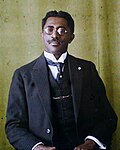
Liberia is a country in West Africa founded by free people of color from the United States. The emigration of African Americans, both freeborn and recently emancipated, was funded and organized by the American Colonization Society (ACS). The mortality rate of these settlers was the highest among settlements reported with modern recordkeeping. Of the 4,571 emigrants who arrived in Liberia between 1820 and 1843, only 1,819 survived (39.8%).
The Whig Party was a political party that existed in the United States during the mid-19th century. Alongside the slightly larger Democratic Party, it was one of the two major parties in the United States between the late 1830s and the early 1850s as part of the Second Party System. Four presidents were affiliated with the Whig Party for at least part of their terms. Other prominent members of the Whig Party include Henry Clay, Daniel Webster, Rufus Choate, William Seward, John J. Crittenden, and John Quincy Adams. The Whig base of support was centered among entrepreneurs, professionals, planters, social reformers, devout Protestants, and the emerging urban middle class. It had much less backing from poor farmers and unskilled workers.
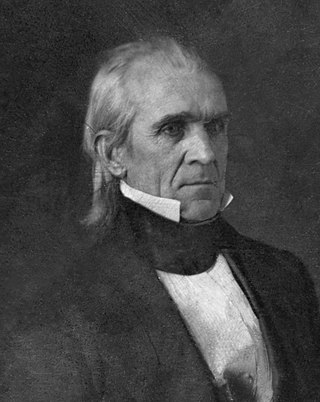
The 1844 United States presidential election was the 15th quadrennial presidential election, held from Friday, November 1 to Wednesday, December 4, 1844. Democrat James K. Polk narrowly defeated Whig Henry Clay in a close contest turning on the controversial issues of slavery and the annexation of the Republic of Texas. This is the only election in which both major party nominees served as Speaker of the House at one point, and the first in which neither candidate held elective office at the time.

The 1852 United States presidential election was the 17th quadrennial presidential election, held on Tuesday, November 2, 1852. Democrat Franklin Pierce defeated Whig nominee General Winfield Scott. A third party candidate from the Free Soil party, John P. Hale, also ran and came in third place, but got no electoral votes.
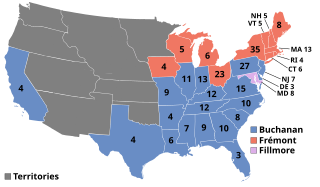
The 1856 United States presidential election was the 18th quadrennial presidential election, held on Tuesday, November 4, 1856. In a three-way election, Democrat James Buchanan defeated Republican nominee John C. Frémont and Know Nothing nominee Millard Fillmore. The main issue was the expansion of slavery as facilitated by the Kansas–Nebraska Act of 1854. Buchanan defeated President Franklin Pierce at the 1856 Democratic National Convention for the nomination. Pierce had become widely unpopular in the North because of his support for the pro-slavery faction in the ongoing civil war in territorial Kansas, and Buchanan, a former Secretary of State, had avoided the divisive debates over the Kansas–Nebraska Act by being in Europe as the Ambassador to the United Kingdom.
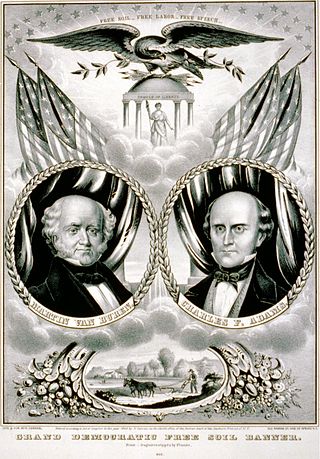
The Free Soil Party was a short-lived coalition political party in the United States active from 1848 to 1854, when it merged into the Republican Party. The party was largely focused on the single issue of opposing the expansion of slavery into the western territories of the United States.

The president of the Republic of Liberia is the head of state and government of Liberia. The president serves as the leader of the executive branch and as commander-in-chief of the Armed Forces of Liberia.
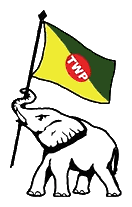
The True Whig Party (TWP), also known as the Liberian Whig Party (LWP), is the oldest political party in Liberia and one of the oldest parties in Africa. Founded in 1869 by primarily darker-skinned Americo-Liberians in rural areas, its historic rival was the Republican Party. Following the decline of the latter, it dominated Liberian politics from 1878 until 1980. The nation was virtually governed as a one-party state under the TWP, although opposition parties were never outlawed.

Charles Dunbar Burgess King was a Liberian politician who served as the 17th president of Liberia from 1920 to 1930. He was of Americo-Liberian and Sierra Leone Creole descent. He was a member of the True Whig Party, which ruled the country from 1878 until 1980.

William David Coleman was an Americo-Liberian politician. A True Whig Party member, he served as the 13th president of Liberia from 1896 to 1900. Born in Fayette County, Kentucky, United States, he emigrated to Liberia in 1853. In 1877, he was elected to the House of Representatives and served as Speaker of the House of Representatives until 1879. Later he served in the Senate and then as vice president before assuming the presidency when Joseph James Cheeseman died in office.

The Republican Party, also known as the GOP, is one of the two major political parties in the United States. It is the second-oldest extant political party in the United States after its main political rival, the Democratic Party.
The Liberty Party was an abolitionist political party in the United States prior to the American Civil War. The party experienced its greatest activity during the 1840s, while remnants persisted as late as 1860. It supported James G. Birney in the presidential elections of 1840 and 1844. Others who attained prominence as leaders of the Liberty Party included Gerrit Smith, Salmon P. Chase, Henry Highland Garnet, Henry Bibb, and William Goodell. They attempted to work within the federal system created by the United States Constitution to diminish the political influence of the Slave Power and advance the cause of universal emancipation and an integrated, egalitarian society.

General elections were held in Liberia in 1923. In the presidential elections, the result was a victory for Charles D. B. King of the True Whig Party, who was re-elected for a second term, defeating Samuel G. Harmon of the People's Party.

General elections were held in Liberia in 1931. In the presidential election, incumbent Edwin Barclay of the True Whig Party was challenged by Thomas J. Faulkner of the People's Party, who had lost to Charles D. B. King in the heavily rigged 1927 elections. Although Faulkner increased his vote share, particularly in Monrovia, where he only narrowly lost, Barclay was elected to a first full term in office.
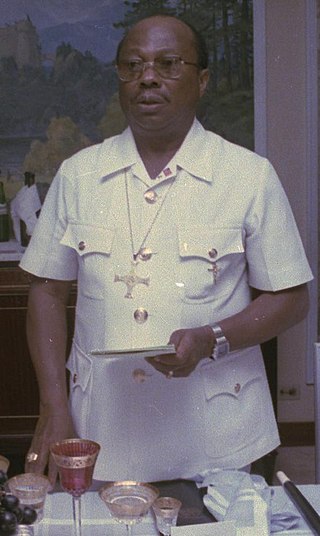
General elections were held in Liberia on 7 October 1975, alongside a simultaneous referendum on presidential term limits. In the presidential election, incumbent William Tolbert of the True Whig Party was the only candidate, and was re-elected unopposed. In the legislative elections True Whig Party candidates won all 74 seats in the House of Representatives unopposed. Voter turnout was around 80%.

The politics of Georgia change frequently and often follow the rest of the United States in major historical landmarks. The state has a long history, starting in the 18th century as a British colony. The cultural makeup of the early colony led to a ban on slavery being overturned soon after its implementation, setting the stage for the many plantations in the state. Rival governments were formed during the Revolutionary War, with the Patriot government surviving and forming a unified state government after the war. Georgian politics then followed the Democratic-Republican Party before the American Civil War and the Democrats afterward. In fact, the state never voted Republican until 1964, making it the last continental state to do so. Since then, Democrats have won the state just four times, for native son Jimmy Carter in 1976 and 1980, Southerner Bill Clinton in 1992, and for Joe Biden in 2020.
National conventions of the Free Soil and Liberty parties met in 1847 and 1848 to nominate candidates for president and vice president in advance of the 1848 United States presidential election. The conventions resulted in the creation of the national Free Soil Party, a union of political abolitionists with antislavery Conscience Whigs and Barnburner Democrats to oppose the westward extension of slavery into the U.S. territories. Former President Martin Van Buren was nominated for president by the Free Soil National Convention that met at Buffalo, New York on August 9, 1848; Charles Francis Adams Sr. was nominated for vice president. Van Buren and Adams received 291,409 popular votes in the national election, almost all from the free states; his popularity among northern Democrats was great enough to deny his Democratic rival, Lewis Cass, the crucial state of New York, throwing the state and the election to Whig Zachary Taylor.

Slaves Today; A Story of Liberia is a novel written by African American author George Schuyler. The first edition of the book was published in 1931 by Brewer, Warren and Putnam in New York. A subsequent 1969 edition was published by McGrath Publishing Co. in College Park, Maryland. The book was first published the same year as Schuyler's Black No More.
The Confederate States of America (1861–1865) only had one president, who was Jefferson Davis. In various American Civil War alternate histories where the Confederacy won the American Civil War and continued its existence, various people have served in the office of the presidency of the Confederacy.
The 1850–51 Massachusetts gubernatorial election consisted of an initial popular held on November 11, 1850 that was followed by a legislative vote that was conducted on January 11, 1851. It saw the election of Democratic Party nominee George S. Boutwell. The ultimate task of electing the governor had been placed before the Massachusetts General Court because no candidate received the majority of the vote required for a candidate to be elected through the popular election.

